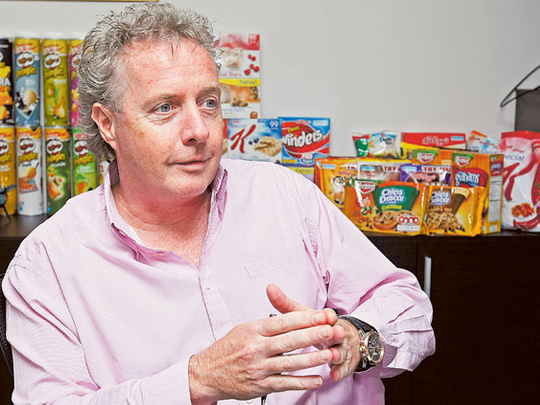
Dubai: Kellogg’s doesn’t want you merely tucking into its cereals… it wants you to savour its snacks as well. Having acquired the Pringles snack brand from Procter & Gamble in 2012, Kellogg’s believes it now has the combination to get more out of markets such as the Gulf, now assigned a high priority among its emerging markets operations.
“Outside the US, we are still primarily a cereal business; the Pringles acquisition has changed our ability to compete on two platforms and we could always do more,” said Paul Norman, president of Kellogg International. “We believe we can accelerate growth in these markets with Pringles having an extremely high transformational value in getting us there.”North America still represents 65 per cent of revenues at Kellogg Company, which last year reported a $14.19 billion turnover. Emerging markets made up $2 billion. Pringles on its own fetched $1.5 billion last year of the total.
As far as the Gulf Cooperation Council (GCC) or the wider territory is concerned, it is easy to see the rationale behind the two brands is better than one strategy. Getting the populace to develop a taste for cereals is still a work in progress – for instance household penetration in a market such as Egypt is still below 10 per cent, while in the UAE it is north of 20 per cent. But even with its lower population base, the UAE has a 4:1 advantage over Saudi Arabia in per capita cereal consumption.
Clearly, Kellogg’s sees opportunities to fill up a lot more breakfast bowls as the cereal of choice for the Middle East consumer. But looking at the wider basket of opportunities with Pringles, Kellogg now has the right mix to get more from these markets.
“In this region it opens up more doors for the company to build scale in operations and invest in more brand building capability,” said Norman.
What the company will not be doing is create joint advertising campaigns involving both brands — “That won’t happen, but what you could see is a back to school event in Dubai where at the point of purchase you will have Kellogg’s and Pringles together as a fun proposition to our customers,” said Norman.
But isn’t it difficult for the company to promote two brands that are, seemingly, quite at odds with what they stand for? “It would restrictive for us just to think about offering nutrition through the cereal brands; there should be fun and delight for our consumers and that’s what Pringles stand for,” said Norman. “We are a house of brands and our consumers are not looking at nutrition at all times.”
But Pringles and Kellogg’s Corn Flakes are not the only levers for the company to pull in higher growth — comfortably in the double-digit territory — in these markets. There is Special K, promoted as the any time of the day “weight and shape management partner” for women. It has already gone big and wide in the UAE and Kellogg’s now sees it doing the same in Saudi Arabia. More markets will be added to the Special K pipeline next year.
“It is our biggest brand globally, bringing in a couple of billion dollars,” said Norman. “In certain markets where Special K does not exist as of now, we are looking at offering a wider range first-up to build scale quickly. In others, we will leverage through the brand equity that already exists through Kellogg’s cereal.”
And will there ever be a Special K for men? “It’s something that we have talked about a lot, but nope, that is not going to happen,” Norman added, emphatically.












